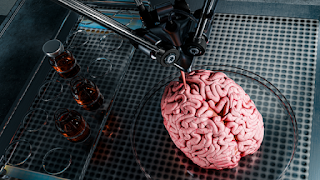-
The bioengineering company, BrainBridge, announced that it has created a mechanical system based on artificial intelligence to perform head transplants, in a move that is the first of its kind in the world.
The bioengineering company, BrainBridge, announced that it has created a mechanical system based on artificial intelligence to perform head transplants, in a move that is the first of its kind in the world.
A shocking video shows how artificial intelligence and robotics are used to transfer the brain and spinal cord into the body of a brain-dead donor.
The developed prototype of the system could be ready to perform the pioneering medical procedure in less than 8 years.
The American startup claims that beneficiaries of this procedure could live longer than the average life expectancy, given that the brain is “capable of continuing to function for several hundred years provided that the rest of the body remains young.”
Speaking to MailOnline, a team of experts said the initial concept was an 'oversimplification of how the brain works', describing it as a 'figment of the imagination'.
But BrainBridge explained that such organ transplants could offer patients with paralysis and spinal cord injuries (for example) the opportunity to have a “fully functioning body.”
The robotic surgery carefully exposes the carotid arteries, vertebral arteries and jugular veins. The blood is then completely drained from the head to prevent clotting, before it is “immediately” connected to the donor’s circulatory system and pumped with fresh, oxygenated blood.
It is claimed that AI algorithms can also track muscles and nerves during surgery to "facilitate smooth reconnection".
After spending up to a month in intensive care, where the comatose patient is monitored and given immunosuppressive drugs, the brain should regain control of the body.
“The goal of our technology is to push the boundaries of what is possible in medical science and provide innovative solutions to those suffering from life-threatening conditions,” said Hashim Al-Ghaili, project leader. “Our technology promises to open the doors to life-saving treatments that would have been unimaginable just a few years ago.”
The company hopes that unveiling this concept will “attract the best talent from around the world who are interested in pushing the boundaries of biomedical science and changing the world for the better.”
It is noteworthy that in 2016, the Legal Ethical Committee of the European Association of Neurosurgical Societies declared that head transplantation in humans is unethical.
However, the committee has no legal authority to stop the procedure, but produces professional guidelines for the practice of neurosurgery.
“The risks to a patient undergoing a head transplant would be enormous, including the risk of death,” she concluded at the time. “There is not a strong evidence base for all steps of the procedure, and for some, there is a lack of proof of concept.”





Informative
ReplyDeleteA very descriptive read.
ReplyDeleteInformative
ReplyDelete